 Petzlover
Petzlover Beauceron is originated from France but Scottish Terrier is originated from United Kingdom. Beauceron may grow 45 cm / 18 inches higher than Scottish Terrier. Beauceron may weigh 40 kg / 89 pounds more than Scottish Terrier. Both Beauceron and Scottish Terrier has almost same life span. Both Beauceron and Scottish Terrier has almost same litter size. Beauceron requires Low Maintenance. But Scottish Terrier requires Moderate Maintenance
Beauceron is originated from France but Scottish Terrier is originated from United Kingdom. Beauceron may grow 45 cm / 18 inches higher than Scottish Terrier. Beauceron may weigh 40 kg / 89 pounds more than Scottish Terrier. Both Beauceron and Scottish Terrier has almost same life span. Both Beauceron and Scottish Terrier has almost same litter size. Beauceron requires Low Maintenance. But Scottish Terrier requires Moderate Maintenance
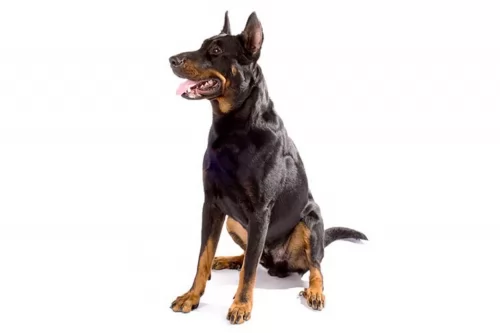 Sometimes referred to as the king of sheepdogs, the Beauceron is a French dog breed that happens to be an extraordinary herding dog too. He instinctively rounds up livestock without even being trained to do so. The dog is also known as Berger de Beauce, originating from the Beauce region in France and is closely related to the Briard or Berger de Brie.
Sometimes referred to as the king of sheepdogs, the Beauceron is a French dog breed that happens to be an extraordinary herding dog too. He instinctively rounds up livestock without even being trained to do so. The dog is also known as Berger de Beauce, originating from the Beauce region in France and is closely related to the Briard or Berger de Brie.
This French breed’s origin goes back to the late 16th century, and the Beauceron was divided into two working types way back in 1863 - the dog with the long coat was known as Berger de Brie or Briard while the short-coated dog became known as Beauceron. It was in 1922 that a club for this dog breed was established, and the Beauceron Club of America was established in 1980, only recently receiving recognition by the American Kennel Club.
 The Scottish Terrier is also known as the Aberdeen Terrier but people who love and know him refer to him fondly as the Scottie.
The Scottish Terrier is also known as the Aberdeen Terrier but people who love and know him refer to him fondly as the Scottie.
These little dogs were originally bred to hunt vermin on farms and their actual origin is ancient. It is believed that the first descriptions of these dogs date way back to 1436 with there being 2 varieties - a rough-haired Scotch Terrier and a smooth-haired English Terrier.
In 1881 the Scottish Terrier Club of England was founded with the Scottish Terrier Club of Scotland being founded in 1888. Scotties were introduced to America in the early 1890s.
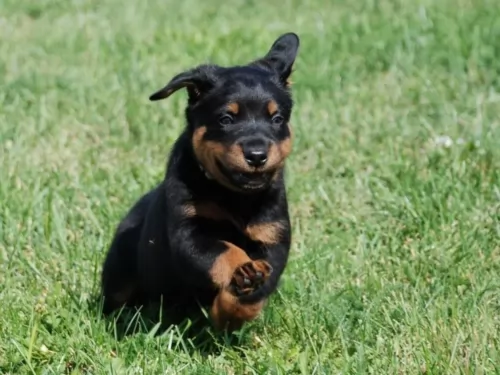 The Beauceron is an intelligent dog, just by looking at the alert, bright face. He is a muscular, large dog breed, standing up to 71cm in height and weighing in at up to 50kg. You’ll recognize him with his dark black coat with red markings, particularly around the feet, which interestingly gives this breed the French nickname Bas Rouge. It means red stockings. Harlequin, tri-coloured grey, black and tan is also recognized as a color.
The Beauceron is an intelligent dog, just by looking at the alert, bright face. He is a muscular, large dog breed, standing up to 71cm in height and weighing in at up to 50kg. You’ll recognize him with his dark black coat with red markings, particularly around the feet, which interestingly gives this breed the French nickname Bas Rouge. It means red stockings. Harlequin, tri-coloured grey, black and tan is also recognized as a color.
The coat is rough, short and dense, the alert eyes dark brown and the ears are set high and can be cropped or natural. The natural ears are half pricked or drop ears and are fairly short. Looking similar to the Doberman and Rottweiler but with a long tail, this French Shepherd dog is somewhat slimmer but with a foreboding appearance. He is solid, well proportioned and well muscled and gives the impression of strength. He has a tolerant nature and will fit in well with a family when trained and socialized.
 The Scottish Terrier is a small dog, fairly robustly built but with short legs. He has a wiry, weather-resistant coat and a soft undercoat. The coat is essentially black but there are other colors too such as a wheaten shade, grey-black and brindle too.
The Scottish Terrier is a small dog, fairly robustly built but with short legs. He has a wiry, weather-resistant coat and a soft undercoat. The coat is essentially black but there are other colors too such as a wheaten shade, grey-black and brindle too.
The ears are erect, the eyes small and bright. The tail isn’t docked but is of medium length and is nearly always held up, without curling over the back.
Height at withers for both males and females should be roughly 23 to 26cm and weight in the region of 8 – 10 kg.
The Scottie is a an independent, robust breed. He is playful as a puppy, but as he matures he becomes more dignified and dour. He is stubborn, but being a terrier he is alert and makes a good watchdog. For a small dog he has a powerful bark.
Brave, loving and loyal, he can fit into life in the city or the countryside so long has he has his human family close by. He doesn’t take kindly to strangers and he he slightly aggressive with other dogs he doesn’t know. He makes a great playmate for children but he certainly doesn’t like being prodded, sat on and poked by small children.
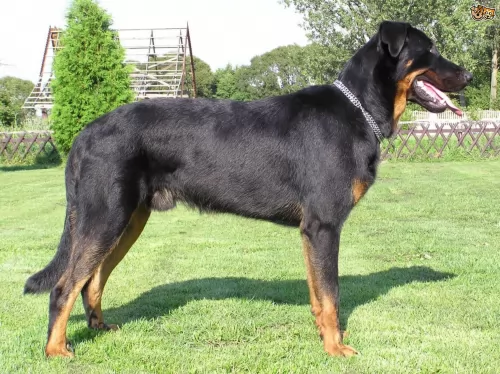 Strong, big, confident and good-looking the Beauceron makes an excellent watchdog, guarding the human family that he is so devoted too. He is a good friend and companion and is tolerant with children and other pets.
Strong, big, confident and good-looking the Beauceron makes an excellent watchdog, guarding the human family that he is so devoted too. He is a good friend and companion and is tolerant with children and other pets.
He is such a clever breed too, and its small wonder that he has always been sought after for hard work – herding, shepherding and even rescue work. When he’s not involved in working, at home, he’s just your big, devoted friend.
 The Scottie is strong willed and independent, and training and socialization is important if you don’t want your Scottie believing he has the final say.
The Scottie is strong willed and independent, and training and socialization is important if you don’t want your Scottie believing he has the final say.
These dogs are stubborn and dominant and will need a strong, firm but kind owner. They’re aggressive with other dogs, but get on well with their human family.
When you bring one of these distinctive looking dogs into your home, he’ll be a loving, loyal friend.
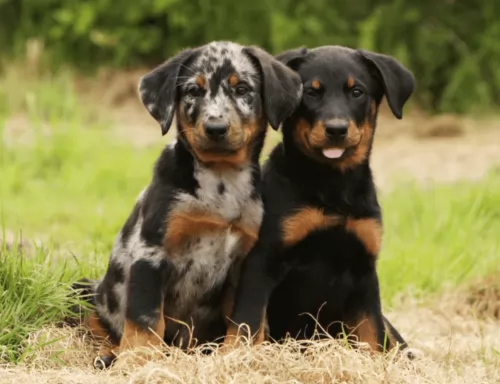 It’s such a nice strong, good-looking dog this, you can’t think of anything going wrong with him. His lifespan is anything from 10 to 14 years and the dog is pretty robust. Being a large breed and a pedigree, he is prone to some common ailments. When you suspect your beloved pet has any health issue, don’t hesitate to get him to the vet.
It’s such a nice strong, good-looking dog this, you can’t think of anything going wrong with him. His lifespan is anything from 10 to 14 years and the dog is pretty robust. Being a large breed and a pedigree, he is prone to some common ailments. When you suspect your beloved pet has any health issue, don’t hesitate to get him to the vet.
A painful disorder that affects larger dogs and brought about by an abnormal development in the joints.
Also a painful condition where the stomach twists so that the blood supply is cut off. Large breeds with deep chests are more prone to developing the condition. Rapid breathing and signs of pain can be indicative of this ailment.
 Your Scottie is looked upon as being a generally healthy dog breed, but as with any other healthy dogs, he can succumb to some of the conditions and diseases that dogs get -
Your Scottie is looked upon as being a generally healthy dog breed, but as with any other healthy dogs, he can succumb to some of the conditions and diseases that dogs get -
This is an inherited blood disorder where the blood doesn’t clot properly. The dog will bleed excessively after an injury. Fortunately, while there isn’t a cure, dogs can lead normal lives.
Scottish Terriers are more prone to developing cancer than other dogs. Bladder cancer, lymphosarcoma and malignant melanoma are just some of the cancers they can get. Some cancers are treatable and there is a good success rate in dogs receiving chemotherapy.
When you brush your Scottie, look out for new, unusual lumps that could be indicative of cancer.
Scotty Cramp isn’t serious but uncomfortable for your pet. When your dog becomes worked up, you’ll see him arching his spine and he walks around for a few minutes with a stiff unnatural gait.
Obesity is regarded as a serious disease as it puts strain on the dogs joints and also creates back pain and digestive disorders.
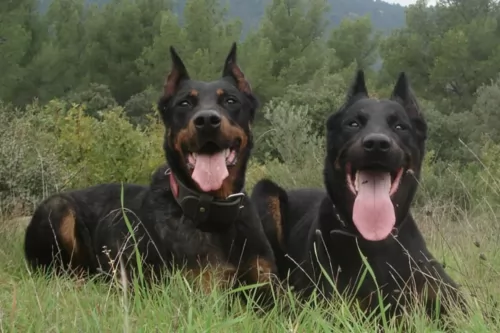 This is a large, hard-working, energetic dog and he will need high-quality food, whether commercially manufactured or home-prepared. The best commercially manufactured dog foods produce foods with the right balance of minerals and vitamins in keeping with your dog’s age, his activities and his stage of life (illness, senior, puppy). If you’re unsure about what to feed your Beauceron, speak to your vet to be 100% that you are meeting his nutritional demands, and always ensure a bowl of cool, clean water is constantly available.
This is a large, hard-working, energetic dog and he will need high-quality food, whether commercially manufactured or home-prepared. The best commercially manufactured dog foods produce foods with the right balance of minerals and vitamins in keeping with your dog’s age, his activities and his stage of life (illness, senior, puppy). If you’re unsure about what to feed your Beauceron, speak to your vet to be 100% that you are meeting his nutritional demands, and always ensure a bowl of cool, clean water is constantly available.
You’re lucky with the Beauceron as he is a low shedding, low maintenance dog with his short coat. He doesn’t require any trimming but will need a good brush twice a week to rid him of loose hairs. Clean his teeth with a special dog toothbrush and toothpaste to avoid plaque buildup. Never use human toothpaste. Clip his nails if he doesn’t wear them down naturally.
This is a big, strong, energetic dog, and you owe it to him to ensure he gets lots of exercise – runs, walks and ball games. If you can’t be a responsible dog owner, don’t own a breed like this as he can become destructive if not kept active.
 Scotties were once bred as working dogs, and they will certainly require daily exercise and stimulation. He will love a walk but you can’t expect him to run with you as he has short legs.
Scotties were once bred as working dogs, and they will certainly require daily exercise and stimulation. He will love a walk but you can’t expect him to run with you as he has short legs.
The Scottie sheds, so he will need to be brushed at least twice weekly. He will require quite a bit of grooming in terms of having the coat professionally trimmed and clipped.
His eyes and ears will need to be checked as well as his teeth. He can’t tell you if he has terrible toothache and while brushing him, check the teeth. Trim his nails too.
It is always recommended that you feed dogs according to size, age and activity levels. Dogs are individuals and they don’t all need the same food.
The quality of the dog food you provide makes a huge difference on your dog’s health. It always pays to go with the better quality kibble available to dogs. Your Scottish Terrier will be depending on your for quality kibble with the right blend of vitamins and minerals.
Dogs thrive on simplicity and consistency and you want to provide him with some home-made food too that gels well with his digestive system. A little bit of raw meat occasionally can also do him the world of good.
Make sure he always has cool, fresh water to drink.